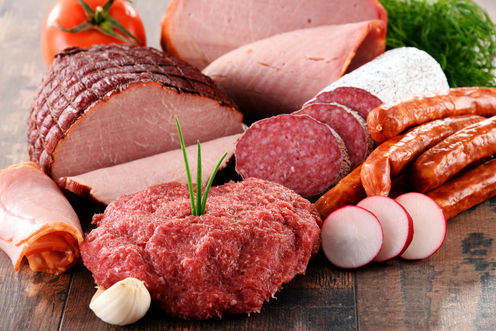
Yesterday, the cancer arm of the The World Health Organization released its evaluation on how likely red and processed meats are to cause cancer.
The verdict? Consumption of processed meat is classified within group 1 – alongside known carcinogens including asbestos, tobacco, arsenic and alcohol. It causes bowel cancer, and is implicated in stomach cancer.
Experts concluded that every 50-gram portion of processed meat daily (that’s two slices of bacon) increases the risk of bowel cancer by 18%.
Red meat ranked lower, in group 2A. It was evaluated as probably carcinogenic to humans, possibly causing bowel cancer. It was also implicated in pancreatic and prostate cancers.
Health authorities responding to these evaluations might reasonably focus their messaging on people who eat red and processed meat five or more days per week. Evidently, these are the people most at risk.
But the results of their efforts can be caricatured or misunderstood by the suggestion that processed meat is now ranked with tobacco smoke and asbestos.
Not the same risk
Placing processed meat in the same category as tobacco doesn’t mean you have the same risk of getting cancer if you eat bacon every day than if you smoke a pack of cigarettes each day.
The equivalence between smoking and eating processed meat exists when it comes to strength of evidence for cancer causation. But otherwise indicating similarity is a distortion, particularly because of the respective burdens of cancer.
Lifetime smoking increases risk of lung cancer 50-fold. But worst case scenarios in relation to processed meat or red meat rarely reach more than two-fold. The 18% increased risk means risk is multiplied by 1.18.
Moreover, meat is a food as distinct from a poison such as asbestos, and so these findings must be understood with the subtlety of reason.
In some media, the findings are already being dismissed with the commonly convenient phrase that “everything causes cancer”.
Authorities drawing attention to carcinogens are characterised as fanatics who believe stepping outside to be a problem, while staying indoors means you’re exposing yourself to cancer risk from every second consumer product. Not so.
Everything does not cause cancer. Overt hazards such as smoking, drinking alcohol, deliberate exposure to sunlight and certain types of pollution, trump all the consumer product scares the papers or the internet can provide.
Rigorous evidence
The WHO determination was made by an arm of the organisation headquartered in Lyon, France: the International Agency for Research on Cancer (IARC).
The branch evaluates the weight of evidence that an agent can increase the risk of cancer by getting together working groups of expert scientists to review published studies in the area.

The IARC’s evaluations are referred to as monographs.
Twenty-two of us were invited by IARC as members of a working group to evaluate the carcinogenicity of red and processed meat.
I was elected Chair of the group which then had sub-groups variously addressing exposure, epidemiological data (that is, studies involving cancer in specified human populations), animal data and biological processes (“mechanisms”) mediating cancer development in particular circumstances.
We reviewed more than 800 epidemiological studies of the relationship between meat and cancer in several countries and continents with varying ethnicities and diets.
These included prospective cohort studies (in which, say, 500,000 or more people provide information about all aspects of their lifestyle whose relevant records are recovered when some are diagnosed with cancer).
These were seen as more informative than case-control studies (in which cancer patients and a similar group of controls are asked, in this case, what they ate 20 or more years ago).
There were also multiple, published meta-analyses (when multiple cohort studies are collated).
Red meat was defined as fresh meat from cattle, sheep, pigs and similar animals and specifically excluded poultry.
Processed meat was meat (most red, but sometimes including poultry) which had been cured, smoked or similarly treated to enhance preservation and/or flavour. This includes ham, bacon, frankfurts, salami, and the like.
The working group did not address the recognised nutrition values of meat, including its provision of protein, iron and range of micronutrients, nor, for that matter, did we address the enjoyment of eating meat.
All determinations of risk were adjusted for other factors, including body weight and calorie intake, and smoking and alcohol intake.
More than 200 publications addressed how small quantities of known carcinogens, either present in cooked meat or which are formed during the digestion of processed meat, may explain cancer causation in the present context.
They showed these compounds may be absorbed and metabolised to reactive intermediates able to bind to DNA and produce mutations.
So the data from such mechanistic studies supplemented the epidemiological studies in providing evidence of cancer causation. It also established options for prevention.
A better understanding
As our understanding of cancer increases, subtlety and insight – rather than elimination and prohibition – may underpin cancer prevention. The information now before us exemplifies that trend.
The recognised causes of cancer have now been expanded, providing a better basis for nutrition advice. Many people stand to benefit.
Bernard Stewart does not work for, consult, own shares in or receive funding from any company or organization that would benefit from this article, and has disclosed no relevant affiliations beyond the academic appointment above.
